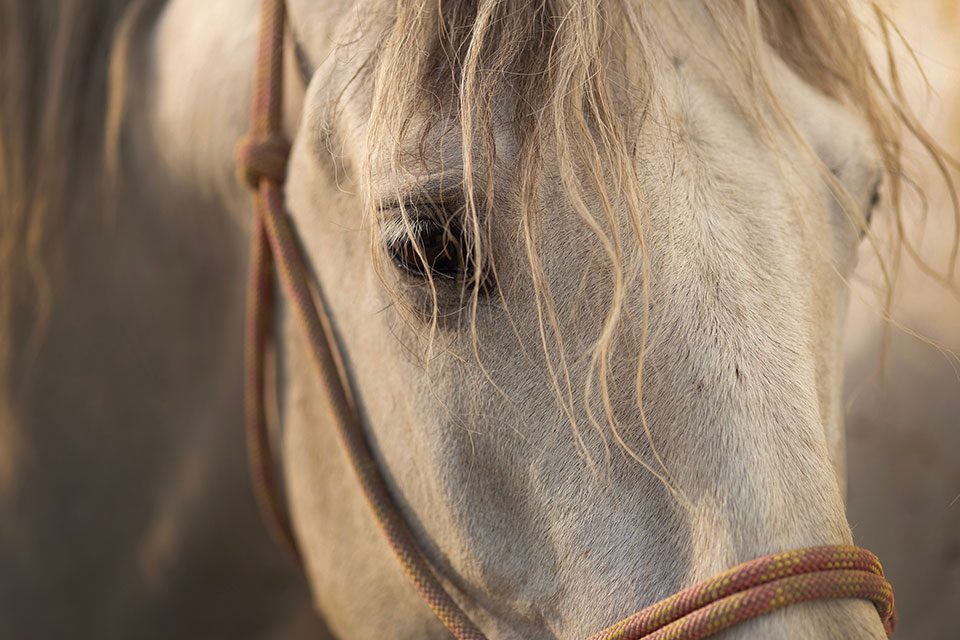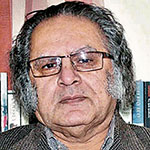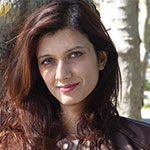Is the Horse Oppressed?

An encounter between a tonga driver and the “cruelty folks” seizes a university student’s attention on his way to class.
Sometimes I remember strange things.
It’s about those days when there used to be a department for the Prevention of Cruelty to Animals. I believe this department is still functioning, but in those days their presence was felt immediately as one walked across a road and noticed two official men on their bicycles. They would always be on duty in a pair, though they may have worked individually as well. I always saw them in a white shalwar kameez with a khaki cap. These officials were called “the cruelty folks” by the laymen, and you could often see them slowly riding their bicycles on the extreme left end of the road. Every time I saw them I used to think to myself: Here is someone who cannot endure cruelty to animals.
Strange things come to mind and in such strange ways. Was the day that has just come to mind cold or hot? I cannot say with absolute certainty, but it must not have been too cold or too hot, or I would have remembered it because of its temperamental intensity. In any case, it was an ordinary day. Yet it was also not an ordinary day, and that is why I am reminded of it with such strange intensity. This memory is reawakened in me like a storm of pollution on the roads. Just imagine waking up one morning, and the moment you come out under the sky you realize that the whole world is enshrouded with layers upon layers of pollution, and if you are a living, breathing creature there is no way out of this oppressive suffocation. If you can imagine this feeling, then you are quite close to the environment of that day that I am reminded of.
As usual, I was going to school, but the distance that I had to cover to reach my college was in no way usual that day. Those twenty to twenty-five minutes that I spend walking through major and minor roads and streets to go to college are never that unusual. I am not saying that what I am going to tell you is extraordinary. But I remember that those twenty-five minutes were the most extraordinary minutes for me. For the very first time a question came to my mind that day: What is oppression? Just like you would ask a student, What is the equator? What is democracy? What is gravity? And so on.
For the very first time a question came to my mind that day: What is oppression?
I was crossing the road when suddenly I was struck by a blast of dust that ruffled my hair and made my skin gritty with dirt. It made me feel rather embarrassed and mortified. That’s when I saw the “cruelty folks” entering the bazaar on the other side of the road. This bazaar was on my way to college, and as I got closer I saw that they held the tonga driver whose name, as I later learned, was Maula Bakhsh. I stopped right there. I had never seen these people on duty before and, before that day, had never wondered why they stopped there.
Some shops were still opening around us, but most of the shopkeepers were standing outside, pretending to clean the area in order to see what was happening. There were some bystanders too. I remember thinking at the time that people will stop to see a spectacle anywhere—even on the slightest suspicion of “something happening” in the most ordinary places like this one. Strange things come to mind and in such strange ways.
The “cruelty folks” had parked their bicycles carefully on the cycle-stand on the walkway. I saw bits of newspaper and other trash floating in the muddy waters of the sewage pipes underneath. And then I thought I should focus on the matter at hand. These floating scraps of paper in the muddy brown water were not important, so I looked at Maula Bakhsh carefully. He was old and frail, and it soon became clear that his horse was older and frailer than him. One of the “cruelty folks” was charging Maula Bakhsh with his crime—“This is cruelty to animals! You’re oppressing the horse!”—while the other official was holding the horse’s reins. The horse did not seem well, and its mouth frothed with a foamy, greenish substance. But Maula Bakhsh didn’t agree that the horse was in a bad state and kept denying it. He insisted that the horse was healthier than himself. He said that he always fed his horse even when he could not feed himself. Suddenly a cloud of dust rose again, irritating the horse’s uncovered eyes. It made the horse shake its head and jerk the reins out of the official’s hands. It was probably the horse’s agitated movement that drew the official’s attention to its eyes, and he shouted: “You idiot! You haven’t even put blinkers on the horse’s eyes?” Maula Bakhsh’s face sank even further. He realized that he would not be forgiven for this negligence. In any case, he offered lame excuses that the blinkers were being repaired and so on.
“The horse will be taken into custody,” an official barked. “You guys have no shame at all. It’s an animal that can’t speak for itself. Think of yourself riding this tonga in place of this horse! What a shame!” Maula Bakhsh started to beg with his palms pressed together: “The horse is fine, Sir. It just looks weak. Some breeds are like that. It’s all fine . . . it’s healthier than me, I can tell you that!” “Oh, you son of a . . .” the officials started to curse Maula Bakhsh while undoing the horse from the cart. Some shopkeepers turned up to settle the matter with these officials: “Sir, please just give him a little fine. This is a question of the poor guy’s livelihood.”
“And yet the old man keeps insisting that the horse is not being oppressed!”
“What proof do you have?” asked Maula Bakhsh, coughing. I remember there was another confectioner who also left his shop to see what was going on. One of the officials gave the reins of the horse to the other and said: “He’s asking for proof? Yaseen, hold this for me so I can show him the proof of his cruelty.” When he came closer to the horse to examine it, I remember his face was lit with the sense of superiority that his professional expertise gave him. I felt enshrouded by a deep calm of reverence and devotion, awed as I was watching someone highly skilled at work. And then my calm was shattered by a dirty gust of wind that burst the bubble of my respectful reverie.
He started to examine the horse and called Maula Bakhsh over. “Look, I can count its ribs. There’s a bleeding wound under its saddle.” He stuck his finger in the blood and wiped it on Maula Bakhsh’s shirt. Then he crouched under the horse’s legs. “C’mere, look at this. This wound is swelling. It’s getting infected.”
“It’s not infected, Sir. It’s an ordinary wound,” Maula Bakhsh protested. I thought to myself that the matter seemed to be dragging on for a long time, and in any case, I had seen these “cruelty folks” in action. Meanwhile, a bystander in the jostling crowd inadvertently knocked over the bicycle of one of the officials, at which point the official started to hurl curses at the crowd: “This isn’t a spectacle—get lost!” I complied with the command and started moving toward my college, bringing with me several questions: What is oppression? Is the horse oppressed? How do we prove that the horse is being oppressed?
I went in twenty minutes late to my first class. After showing his displeasure, my professor let me enter. At the end of the class he asked, “Any questions?”
I don’t know anything about chemical, psychological, physical, or emotional reactions, but they all seemed to come together in such a way that I blurted suddenly: “Sir, is the horse oppressed?” Clearly, it had nothing to do with the subject of the class, and the result was that I reached the cafeteria ten minutes before the rest of my friends.
When they all arrived—Mushtaq the Bird, Sajid, Zareena, Saqib, poor Parveen, and Sulaiman Shah—they were quite serious. They couldn’t believe that a student like myself would joke with a professor like that. They started doubting my mental state, and when I told them that it was not a joke, they became convinced that something was wrong with me. I had to explain the whole matter to all of them. Immediately poor Parveen sighed, “Oh, poor horse.” She said things like that so often that we’d started calling her “poor Parveen.” Mushtaq the Bird, who would sometimes flap his elbows like wings while speaking, as if he would fly away at any moment, said with a rather scholarly air, “That, indeed is a strange question, my friend. . . . The importance of this question can’t be denied. Human beings can tell when they are oppressed, but animals . . .” “It’s even difficult for humans to express, and animals . . .” As usual Zareena didn’t bother to finish her sentence. Sulaiman Shah laughed and said: “This means we have to learn the language of animals in order to find out the answer to this question.” When he laughed again, a gust of wind blew dust straight into his mouth. “What the hell is wrong with the weather today? What kind of wind is this, anyway?” he sputtered. Everyone then decided to move inside the cafeteria.
Sajid was deeply immersed in thought, as if listening to something deep in a well. At last, he came out of his well and spoke in a grave tone: “Before we answer this question, we need to work out a general theory of oppression. To achieve this feat, we should seek guidance from our professors at this great university of ours. After all, this place is the furnace of knowledge from which people are molded into solid gold.” Upon hearing this, Saqib, who until then had remained quiet, intervened: “Some people actually turn into flames here and never manage to come out.” And then I remember our collective madness to answer the question: Is the horse oppressed?
Mushtaq the Bird warned everyone that involving the professors could have serious consequences.
Mushtaq warned everyone that involving the professors could have serious consequences. Later circumstances proved that his warning was not wrong. That windy day became the day of “Is the horse oppressed?” We went door to door in every department, but most of the learned professors shooed us away, dismissing the question as useless, inappropriate, ridiculous, and so on. One of the reasons for their dismissal could be that we never provided the context of the question. Indeed, some professors thought we were messing with them: “Is this a trick? Whose leg are you pulling? Who are you calling a horse?”
However, our zoology professor took the question seriously, probably because it was about animals. He said: “If oppression is synonymous with pain for animals, then it is a psychomotor event, which produces an avoidance response and is absolutely crucial to survival.” After receiving this response and coming out of the zoology department, I remember that Sajid had hunkered down in his well again and remained there for the rest of the day. Finally, we visited the philosophy department, where we encountered two responses: one was that oppression, mercy, and cruelty are all subjective constructs and have no standing as objective phenomena. The other response, which was very objective, was a concealed message from the university administration that a group of students was carrying out miscreant activities on campus and must be extirpated as soon as possible. We would definitely have been apprehended had we not dispersed right away upon hearing this. However, before we scattered, Saqib had pontificated: “Horses and men never grow old and most of our professors are men . . .” and then elaborated on several biological dimensions that were embarrassing for the women in our group. This was probably another reason for us to disperse that day.
I took the usual road on my way back. I remember that as I was passing the bazaar where they had verified that Maula Bakhsh’s horse was being oppressed, something sparked inside me and I was flooded with the thought that something is going on here. As I stood for a moment in the spot where it had all happened, a shopkeeper called out to me. I remember that sometimes I’d buy pencils, paper, and the like from him as I passed by in the mornings. He said: “Young sir, I saw you were here this morning, when the ‘cruelty folks’ arrested Maula Bakhsh. I saw you then.” “Yeah, I was here. So what happened?” I asked.
“They left it . . . the horse, they left Maula Bakhsh’s horse!”
The expression on the shopkeeper’s face was rather strange. I had never seen him like this before. “They left everything, Sir! Maula Bakhsh died right there.”
I remember feeling as if somebody had slammed me with a huge block of ice. Yet I remember that day was neither too cold nor too hot . . .
“Well, one never knows when one dies. They were untying the horse when Maula Bakhsh fell down and breathed no more.”
I, of course, took a deep, long breath. I looked at the shopkeeper and moved ahead. It was still windy, with dust blowing everywhere, and I remember being taken over by a strange, mad desire. I felt like opening my mouth and filling my lungs with every last bit of the dusty, dirty, polluted air. . . . Strange things come to mind.
Even today I still find myself caught up in this puzzle of what oppression is.
Strange things come to mind . . . and in such strange ways. This was all a long time ago. Now I am an important officer, and this all came back to me so strangely. There is a file here before me, containing complaints from various parties, in which they have emphasized over and over that they are being oppressed. Even today I still find myself caught up in this puzzle of what oppression is. That is why I am handing over this file to another department. Strangely enough, today too is a day just like that one: windy with gales of dust and pollution. Although the air- conditioner in my office prevents this pollution from getting to my skin, I see it through the windows. . . . It is just like that day. Strange things come to mind.
Translation from the Urdu












